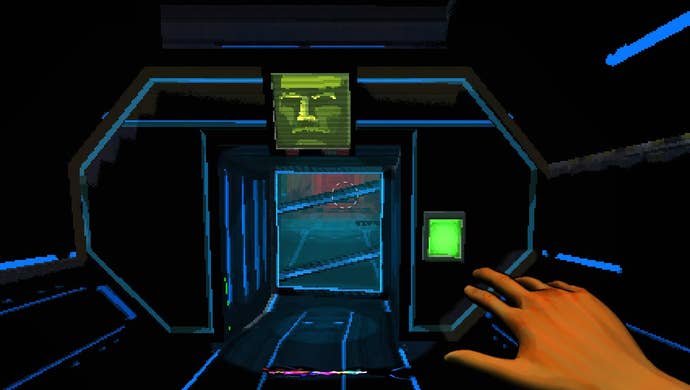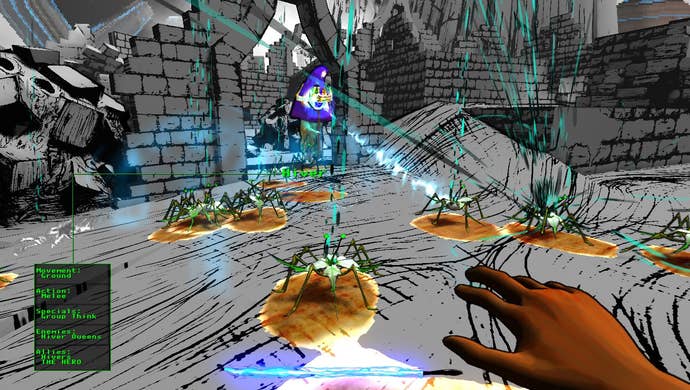The Magic Circle PC Review: Development Hell in a Handbasket
Question Games' engrossing experiment traps players inside an unfinished game for a fly-on-the-wall view of a pet project gone horribly wrong.
This article first appeared on USgamer, a partner publication of VG247. Some content, such as this article, has been migrated to VG247 for posterity after USgamer's closure - but it has not been edited or further vetted by the VG247 team.
Even if you only follow the industry tangentially, it should be crystal clear that making video games can be an incredibly messy business.
The past five years alone are littered with horror stories about studios falling on their swords after a single project gone wrong. Though several developers fail to make the cut with the coming of each new hardware generation, the HD era has been particularly dire, forcing teams to grow exponentially to overcome new challenges—leaving one poor sap in charge of perpetual cat-herding for years on end. Then we have the consumers and their demands; often well-intentioned, but just as often without the knowledge of how things are actually done.
When you get right down to it, it's a wonder why anyone wants to be a part of this business in the first place.
These are the issues explored by The Magic Circle, an environmental puzzle game by Question Games, a development team that—as you probably guessed—has plenty of experience with AAA game development, with some of its members having worked on titles like BioShock and Dishonored. This game-within-a-game traps players within The Magic Circle, a decade-in-the-making pet project created by the very Lord British figure, Ishmael Gilder (played with a convincing mix of exasperation and weariness by The Venture Bros.' James Urbaniak.) While you're at first asked to do some basic QA testing during the most desperate minutes of the development cycle's eleventh hour, a rogue AI soon sends you on a much more important mission: spiting the "gods" who trapped him(?) within the confines of unfinished content.
After this initial setup, The Magic Circle drops you into its sandboxy world, with "taking out the sky bastards" as your overlying goal. Unlike your average environmental puzzle game, though, you can interact with the inhabitants of this world on some pretty deep levels. Thanks to the help of the rogue AI, if you see another living thing, friendly or hostile, you can hack it to change its behaviors, or simply steal these actions and properties for use in something else. And there's quite a bit of leeway as to how you can solve these puzzles; if you need that key sitting on a distant ledge, for instance, you can hack the monster on the ledge to make hostile towards keys—causing it to knock this item into the valley below—or give the key the power to move, and have it hop over to you by tagging it as your ally. If you're into tinkering with a game's moving parts, there's lots of fun to be had here. And unlike Double Fine's Hack 'n Slash, you don't necessarily need a programmer's mindset to figure things out
One of The Magic Circle's greatest strengths lies in how much freedom you're given while digging around in the guts of this unfinished game. Essentially, you're trying to find the right assemblage of entities and corresponding behaviors to pull the main "sky bastard" into hacking range, but The Magic Circle doesn't provide much guidance as to where you're supposed to go, and in what order. While the first areas you'll stumble upon contain all the elements you need around the puzzle itself, soon after that, you'll need to be a lot more creative. Thankfully, The Magic Circle provides some pretty useful tools to facilitate puzzle solving: It's incredibly easy to jump to one of several nodes on the map, and anything you've interacted with can instantly be summoned to your side.

This sense of openness also has its downsides, though. Some of my most frustrating moments with The Magic Circle came when I assumed I'd scoured every inch of the environment, only to watch a YouTube walkthrough—thanks, Early Access—and discover I'd completely missed the one enemy behavior necessary to push me in the right direction. With the fast-travel and summoning options, I do think Question Games realized the problem with this lack of guidance, but it can still be irritating when you just want to move on—and absorb the next slice of story.
And The Magic Circle's story is definitely one worth telling. While it falls back on some standard devices, like audio logs, here, they're presented in a way that makes sense: The development studio is bugged, in case anyone working there comes up with an idea that might make them money. (A practice that's not too far removed from reality.) But The Magic Circle tells its tale in some unorthodox ways as well: as you play, you continue to annoy Ishmael and his team, though one of his peers may have a use for you. And the supporting cast plays off the creator's misery well: Maze Evelyn, the pragmatic producer and former professional gamer, counters Ishmael's unrealistic goals at every turn, while Coda, the enthusiastic and slightly ignorant superfan, plays the part of a young idealist who hasn't learned her industry of choice doesn't care much for people.

Since I write about games for a living, it's hard to tell exactly how "inside baseball" The Magic Circle can get, but it touches upon every aspect of gaming with a real sense of authenticity, and without getting too self-indulgent. And while it would be easy to set Ishmael up as a myopic egotist, The Magic Circle does an effective job of making him very sympathetic by detailing the countless struggles involved in making a game. As deluded as Ishmael is by his "vision," he ultimately wants to create an experience that transcends the typical video game experience. "[Video games] treat you like a lizard with a credit card who can't stay awake without watching something die," Ishmael says in a particularly cutting piece of dialogue.
While I had my frustrating moments with The Magic Circle, it's a game I'm going to be thinking about for a long time. Though its satire doesn't necessarily take a side—something that normally irritates me—Question Games has something to say about nearly aspect of the game industry, and its commentary ends up being insightful more often than not. Though The Magic Circle takes place in its own world, it's not hard to see the correlations between this fictional creation and similar real-life productions that never materialized. And even if you're not deeply invested in the world of game development, The Magic Circle has a lot to teach you—and a deeply personal story to keep you hooked until the end.
ConclusionThe Magic Circle could have easily went with the normal limited interactions of the standard environmental puzzle game, but Question Games took things one step further, adding rich mechanics that allow players to tinker with its inner workings on some seriously impressive levels. This kind of open-ended ambition may leave players feeling lost at times, but its exploration of the act of creation and collaboration will stick with them for years to come.

